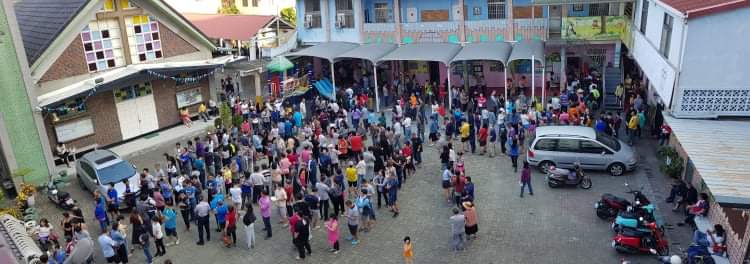Parish grounds used as polling station for Taiwan’s midterm elections

Kaohsiung City, TAIWAN—On November 24, 2018, St. Nicholas Parish compound in Daliao was used as one of the polling stations for the elections of local officials, city legislators and district chiefs in Kaohsiung city. For the past several years, the OAR parish had been a venue for many elections held, both local and national. The OAR Friars deem it their civic duty and thus were greatly honored to accede to the request of the government for the use of the Parish’s compound and facilities.
This midterm election saga in Kaohsiung generated a feverish frenzy not only within the city confines but also countrywide, never seen before in previous elections of recent memory. For the past 20 years, Kaohsiung had been the stronghold of the Green Min Chin Tang Party (DPP 民進黨) until the emergence of a dark horse Han Guo Yu 韓國瑜, a charismatic candidate for City Mayor of the Blue Kuo Min Tang Party (KMT 國民黨), who lit a firestorm of excitement to KMT base and even to the political fence sitters.
Suddenly the confidence of the Green Party of its surefire victory was shaken to the core and was put in serious doubt. The Green Party represented by its Mayoral candidate Chen Chi Mai 陳其邁 was suddenly the one playing catch-up. Everyone took notice, even the political elite, due to the groundswell of support from the young and ordinary folks who were captivated by the bold promises and winsome personality of Han Guo Yu.
Lacking support even from his own political party which in the early part of the campaign did not deem him a winnable candidate, he deftly and efficiently used the social media to his advantage by live streaming his political speeches and other activities. Thus, he won the hearts and minds of majority of Kaohsiung voters enabling him to wrest control of once formidable choke hold of DPP in the south. Not even the famous outgoing mayor of Kaohsiung Chen Chu can persuade the voters to stay the course of DPP rule in Kaohsiung.
This midterm election was specially important to the Catholic Church and other proponents of traditional family and moral values in Taiwan because some newly passed laws diametrically opposed by the Church were put into referendum for people to decide whether to confirm or abrogate.
The two hotly debated issues were about gay marriage and the teaching of LGBT issues in elementary and middle schools. No. 10 question for referendum thus asks “ Do you agree that Civil Code regulations should restrict marriage to being between a man and a woman?” To this the voters strongly agreed, hence abrogating the previous legislation passed in Congress which would make Taiwan the first place in Asia to recognize legally gay marriages.
No.11 question asks “Do you agree that the Ministry of Education and individual schools should not teach homosexual related education, as detailed under the Enforcement rules for the Gender Equity Education Act, in Elementary and middle level schools?” Once again, the Taiwanese voters agreed resoundingly that these topics should not be taught to impressionable minds in elementary and middle schools. Thus, it means that books and other teaching materials about LGBT topics that were already being taught should now be revised and new teaching materials reflecting the will of the electorate be developed and used.
Fray Joel G. Dequilla, OAR
